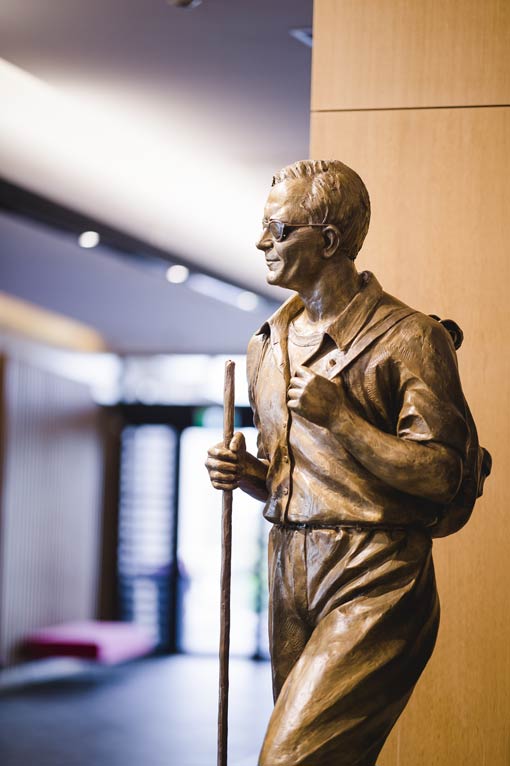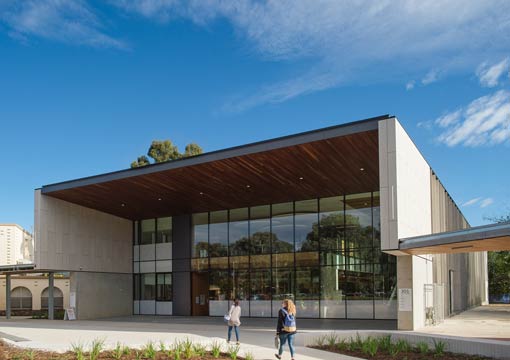The ACU Ethics Hub is celebrating the 30th anniversary of Ex Corde Ecclesiae with a ‘Masterclass on Any Catholic University’, exploring how various member groups are understood in the Catholic intellectual tradition. In this lesson, Professor Ramsay explores the role of properties and facilities staff.
Properties staff maintain people, as creatures of both body and spirit, and in so doing they are critical for Catholic universities as for any complex institutions.
“Universities are consecrated to truth, in the words of St John Paul II in Ex Corde Ecclesiae, and that should affect our buildings.”
Properties and facilities staff maintain properties and facilities – but that is not actually true. What they maintain is people. People are physical beings and so they need places to be, physical environments that keep them safe and comfortable, facilities that allow them to function. People also are more than physical – they are alive with a rich set of abilities, or as the tradition puts it, they have ‘soul’. That means we also need physical spaces because they delight us, attract us, make us able to socialise and keep us secure when we want to be alone.

Properties staff maintain people, as creatures of both body and spirit, and in so doing they are critical for Catholic universities as for any complex institutions.
Universities are consecrated to truth, in the words of St John Paul II in Ex Corde Ecclesiae, and that should affect our buildings. Truth stands against ignorance and deception – so our buildings should encourage openness of contact and discourse and should be honest about what we stand for; truth stands against lies – and so our buildings should not look like the buildings of a bank or a hospital or a prison or a domestic home, should not mislead but look like a university; truth stands against superstition – and so our buildings should present the faith in which they are built and blessed and not any other position or ideology.
Above all, our buildings should encourage study and knowledge, and so our learning spaces should not just be classrooms and labs but the garden, the café, the chapel, the playing fields, the meeting rooms – every university space should open up curiosity and propose opportunities for fresh thought and reflection.
Properties staff include a vast range of professionals – capital planners, architects and managers, designers and maintainers, painters and maintenance. The staff who use their strength and skill to set up rooms and move around offices deserve our particular gratitude – they use their bodies and strength so the rest of us can do our jobs safely and securely. But everyone in that team brings skill and dedication.
Exterior and interior spaces have immediate impact and effect on us. Properties and facilities therefore carry the responsibility to focus everyone daily as they arrive at work and move around and so confirm us in our work. The buildings are not there as commercial units but to lift spirits, direct efforts, celebrate the life of the mind which at the end of the day is what we are all here to serve. Buildings then should be maintained to highest physical standard – but with an eye always to the (non-physical) reasons for our presence here together.
Resources are precious. Our property is to be stewarded for the sake of people but with a commitment to reduce waste, minimise one-off and short term consumption, contribute to a world at least as stable and safe as our world, reduce damage to the natural environment, increase contribution to the social and cultural environment, In short, the Catholic principle of an integrated ecology – a oneness of creation, objects and people – is to be followed.
People get passionate about the buildings and rooms they use or visit, from the Opera House to the Cricket Ground. If we visit and use buildings and rooms almost every day as we do in the workplace, the investment is all the deeper. This is a good thing, but Properties and facilities sometimes must remind us all these facilities are not ‘ours’, not to be used and treated as we choose. They are the institution’s property but more importantly, all of them serve the institution’s stated goals of truth and faith, goodness and gift. We should detach then, as well as attach, for we are just passing through; and in getting this balance right the professionals at properties and facilities are our true guides and friends.

Environmental sustainability is a key part of the ACU mission to promote the common good and social justice.